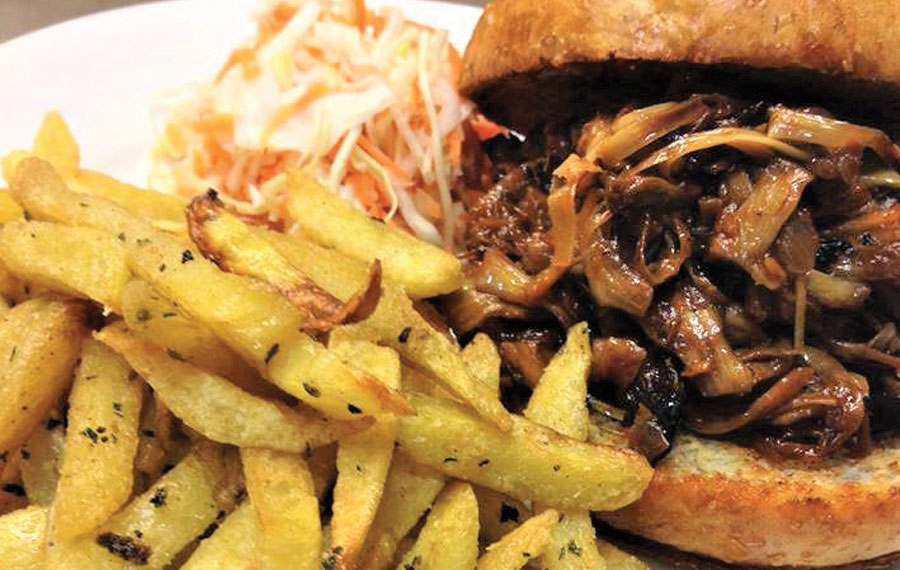
Every Fourth of July while the whole country is grilling hunks of meat, I’m reminded of my 15 years as a vegetarian when my options consisted of eating the side dishes (many of which are no healthier) or those bland, highly processed meat substitute hot dogs and burgers. While I’m no longer a vegetarian, and meat substitutes have certainly gotten tastier, I have a fair share of vegan and vegetarian customers and friends and I don’t like them to feel left out of the festivities. A few years ago, while prepping for our annual July Fourth extravaganza at the American embassy, I realized the solution could be found in, of all places, my garden.
If you’ve visited Southeast Asian markets, you’ve seen a Tyrannosaurus-sized green pebble-skinned fruit known as Jackfruit, a tree species related to figs, mulberry and breadfruit. The largest tree-borne fruit in the world (some of the fruits weigh up to 100 pounds,) jackfruit trees originated in southwest India and spread to tropical countries in Southeast Asia — Thailand, the Philippines, Malaysia and Indonesia. The nutritious fruit has been eaten for centuries and it’s thought that even as early as 1000 B.C.E., a Jewish colony in Kerala, in India’s southwestern Malabar coastal region, had an established trade route with the ancient cities of Mesopotamia.
Jackfruit is also popular in Brazil and subtropical Africa, where a single tree can produce up to 200 fruits a year, or upward of three tons of food, providing sustainable nutrition from the flesh as well as the seeds, which are boiled and roasted or even ground into flour and used for baking. In India, the young leaves are used to fatten up cattle and livestock and the heated latex made from the milky sap is often used as household glue for mending china and earthenware pots.
All over the world and increasingly in the U.S., vegan communities have discovered the benefits of cooking with plant-based meat alternatives, but unlike soy or it’s highly processed byproducts like tempeh and tofu or seitan — a popular meat substitute made from wheat gluten (an allergenic to a percentage of the population) — jackfruit is virtually unprocessed. Even when canned, most commonly in a saltwater brine, jackfruit is a nutritional powerhouse, full of fiber and packed with vitamins C and A, as well as minerals like magnesium, potassium and manganese.
Because I have a jackfruit tree in my backyard in Uganda, I’ve experimented with many recipes for barbecue sandwiches and tacos, but because of the size of the unwieldy fruit, it’s a fairly laborious process to separate the flesh and remove the seeds from its stringy womblike interior. It’s like doing battle with the fruit, using slippery oiled fingers to prevent the latex sap from sticking to every imaginable surface, including hands and nails. A far simpler alternative is to buy canned jackfruit sold at Whole Foods or readily available in Asian, Indian and Caribbean grocery stores or even online. Then it’s just a matter of sautéing the jackfruit with aromatics and roasting it in the oven with your favorite barbecue sauce.
When shopping for canned jackfruit to make into a savory dish, like the recipe for pulled barbcue “meat” below, make sure you check the label carefully. Only buy cans with labels that read “young and green jackfruit packed in brine” or “young jackfruit in water.” Do not buy ripe jackfruit packed in syrup for this application.
When I did a side-by-side taste test of “pulled jackfruit” and pulled brisket, it was nearly impossible for even avowed meat eaters to differentiate between the two.
When I did a side-by-side taste test of “pulled jackfruit” and pulled brisket, it was nearly impossible for even avowed meat eaters to differentiate between the two. Both had the same chewy texture and unctuous bite, and because I used the same sauce and spice mixture, they were virtually undiscernible from each other. I served it in a whole wheat toasted bun with oven-baked parsley and Parmesan fries and crudito — a tart pickled mayo-free coleslaw made from cabbage and carrots. It would be wonderful to ramp up the nutritional content of this meatless meal with a side of baked beans since jackfruit doesn’t supply nearly as much protein as meat.
This Fourth of July weekend, try this dish and introduce your carnivorous and vegetarian friends to the most exotic barbecue of their lives. Not only will you stun them when you admit that this flavorful meaty-tasting sandwich is made from jackfruit, you may even find a new staple for the summer grilling season without ever having to visit the butcher or strike a match.
Vegan Pulled Meat Barbecue
2 (20 oz.) cans “young, green jackfruit” packed in saltwater or brine*
2 tablespoons olive oil
1 large yellow onion, thinly sliced
3 cloves garlic, minced
1 teaspoon sea salt
*Do not use ripe fresh jackfruit or canned jackfruit in syrup for this recipe.
Barbecue sauce ingredients:
3 chipotle peppers in adobo sauce,
chopped — plus 2 tablespoons of the sauce they are canned with
1 cup no-sugar-added ketchup
1/2 cup apple cider vinegar
2 teaspoons prepared Dijon mustard
1 teaspoon smoked paprika or 1 tablespoon sweet paprika plus 1 teaspoon of liquid smoke
1 teaspoon ground cumin
1 teaspoon black pepper
1 teaspoon chili powder
1/2 teaspoon cayenne pepper (optional)
1 tablespoon molasses
1/4 cup packed brown sugar
1/2 cup water (more as needed)
Drain and rinse the jackfruit, breaking up any large pieces of fruit with your fingers, then dry the fruit well and set aside.
Heat oil on medium heat and add onion, garlic and salt, and sauté until onion is soft and begins to caramelize. Add reserved jackfruit and then all barbecue sauce ingredients along with 1/2 cup of water and cook until mixture is bubbling. Turn down the heat to medium low, stir well and cover pot. Continue to cook for 20-30 minutes, stirring occasionally to prevent ingredients from catching on the bottom of pan. Add more water if necessary, to prevent burning.
Preheat oven to 400 F and line a large baking sheet with parchment paper. Remove jackfruit from pot — it should be tender and sauce should be thick. Pull pieces of jackfruit apart with two forks or your fingers to resemble pulled meat and spread on prepared baking tray in an even layer.
Roast in oven for about 15 minutes or until water is evaporated, jackfruit looks darker and caramelized and is held together by a thick, reddish sauce. Make sure to taste and adjust salt, sugar and spice level to your preferences.
You can skip the barbecue sauce ingredients section and instead simmer jackfruit, onions and garlic in 1 1/2 cups of your favorite store-bought barbecue sauce combined with 1/2 cup of water.
Serve in toasted buns or corn tortillas and top with coleslaw or pickled vegetables.
Serves 6 on buns or makes filling for about 12 tacos.
Yamit Behar Wood, an Israeli-American food and travel writer, is the executive chef at the U.S. Embassy in Kampala, Uganda, and founder of the New York Kitchen Catering Co.





















 More news and opinions than at a Shabbat dinner, right in your inbox.
More news and opinions than at a Shabbat dinner, right in your inbox.